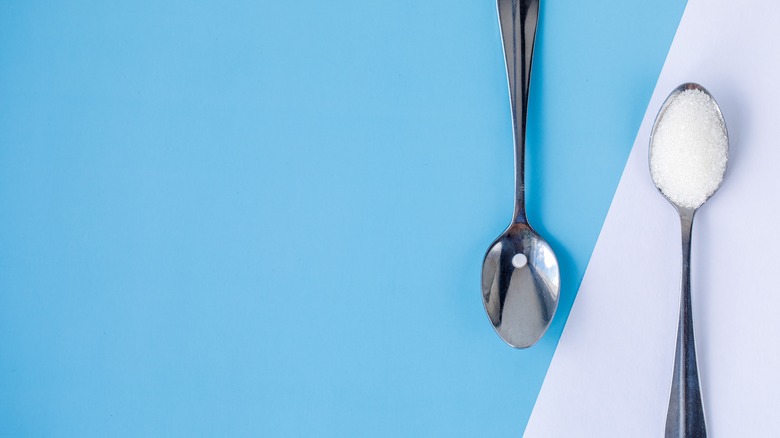Here's How Much Sugar You Should Be Consuming Per Day, According To A Doctor
We may receive a commission on purchases made from links.
You've probably felt guilty reading an article about sugar cravings, or maybe even been lectured about your excessive sugar intake by a doctor. What is likely being discussed, however, are added sugars or refined sugars, and not the carbohydrates inherent in certain foods like fruits, vegetables, and grains, per New Scientist. Added sugars are found in plenty of products you pick up at the store, from sauces and granola bars to cereals and soft drinks (via TED-Ed), and avoiding them takes intentional effort.
In fact, it was only recently that the Nutrition Facts label on food products started printing added sugar content separately, as reported by the U.S. Food and Drug Administration. The history of how sugar came to be what it is today — a foodstuff that we rely on almost as much as we depend on fossil fuels according to The Conversation — is an interesting one. What started off as nourishment for pigs eventually became the reason for a boom in the slave trade. And yet, our diets originally contained little to no refined sugars.
Health professionals continue to warn us of the many negative effects excessive sugar intake has on our overall health, but the information out there can be confusing, especially when it comes to just how much is too much. Thankfully, Dr. Mark J. Tager, MD, author of "Feed Your Skin Right," speaking exclusively to The List, broke it down for us.
Sugar shouldn't account for more than 10% of your diet
Dr. Mark J. Tager is the CEO of ChangeWell Inc., and his advice to those looking to cut back on their sugar intake is to use this simple metric: "No more than 10% of the diet should be free sugars." Free sugars are what you typically find in cookies, candy, and cereals, for instance, per the NHS. They're basically the added sugars put in to enhance flavor. Free sugars also refer to sugar that is naturally present in juices made from fruits, vegetables, and honey, among many others.
As Dr. Tager explains, "The average American consumes 100 grams of added sugar a day." Therefore, if you were to follow the recommended amount of 10% of your diet, you'd probably have to start off by calculating just how many calories you consume each day. If your intake comes up to the recommended 2,000 calories a day, you should be consuming "no more than 200 calories" of added sugars per day, according to the doctor. This translates to "about 40 grams or less."
There's zero nutritional value in added sugars (via Healthline), and eating too much sugar does a lot of bad stuff to your body. Alongside causing health conditions like heart disease and type 2 diabetes, excessive sugar intake has also been linked to poor metabolism and obesity. It even contributes to depression and anxiety, according to Forbes.
Are there any healthier alternatives to sugar?
Cutting back on excessive sugar intake can seem like a daunting and even impossible prospect at first, especially if your brain has become accustomed to how it stimulates its reward system, per TED-Ed. Sugar can become addictive over time, but there are definitely healthier replacements out there, according to Dr. Mark J. Tager, the author of "Feed Your Skin Right."
"We don't eat enough fruits," he informed The List simply. "They are rich sources of fiber, antioxidants, and minerals that the body — and the skin in particular — need." There are numerous benefits to adding fruit to your daily diet, some of which include reduced blood pressure, less risk of cardiovascular disease, improved vision, and better digestive health (via Harvard University).
Moreover, the Centers for Disease Control and Prevention cautions that not nearly enough Americans consume the recommended daily serving of fruit, which is 1.5 to 2 cups FYI. Ensure you eat the whole thing, though, rather than just enjoying the juice, since this can be sugary too, as Tager points out.


